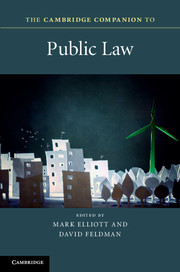Book contents
- Frontmatter
- Contents
- Notes on Contributors
- Introduction
- 1 The distinctiveness of public law
- 2 The politics of public law
- 3 The rule of law in public law
- 4 Legislative supremacy in a multidimensional constitution
- 5 The politics of accountability
- 6 Rights and democracy in UK public law
- 7 Public law values in the common law
- 8 Public law and public laws
- 9 Public law and privatisation
- 10 State architecture: subsidiarity, devolution, federalism and independence
- 11 Soft law never dies
- 12 The impact of public law litigation
- 13 Designing and operating constitutions in global context
- Index
- References
3 - The rule of law in public law
Published online by Cambridge University Press: 05 September 2015
- Frontmatter
- Contents
- Notes on Contributors
- Introduction
- 1 The distinctiveness of public law
- 2 The politics of public law
- 3 The rule of law in public law
- 4 Legislative supremacy in a multidimensional constitution
- 5 The politics of accountability
- 6 Rights and democracy in UK public law
- 7 Public law values in the common law
- 8 Public law and public laws
- 9 Public law and privatisation
- 10 State architecture: subsidiarity, devolution, federalism and independence
- 11 Soft law never dies
- 12 The impact of public law litigation
- 13 Designing and operating constitutions in global context
- Index
- References
Summary
Is the political ideal we call ‘the rule of law’ biased towards private law? There are definite tendencies in that direction and these tendencies make it difficult to develop an understanding of how the rule of law applies in the realm of public administration. The tendency towards private law also introduces an unwelcome ideological element, inasmuch as the rule of law can all too easily become associated with special respect for the rights of property owners, employers, and investors in cases of conflict between these rights and the business of public administration.
Of course the business of public administration is not self-justifying. And the rule of law is not doing its proper normative work unless it disciplines and constrains the way that business is carried out. Still, we should consider the prospects for a normatively robust conception of the rule of law that does not minimize or deprecate the mission of public administration. That is what I shall undertake in this chapter.
A unified ideal?
The task of developing a conception of the rule of law that applies to public law in particular faces an immediate challenge from those who deny the importance of the traditional distinction between public and private law. Maybe there is no distinction. Maybe we should say that in the last analysis all law involves the operation of the state on society; all law is public law in some ultimate sense. If so, then perhaps the rule of law should be conceived as an entirely general idea, prescribing the uniform application of a discipline of legality to state action across the board. After all, whether the state is operating in the field of public administration or whether it is resolving private disputes, we have to face the possibility that it might be acting extra-legally, without reference to legal rules, principles, and procedures. We might say, normatively, that the point of the rule of law is to foreclose that possibility – again across the whole field. We might say that; but should we? When we subject the state's operation in the field of public administration to the discipline of the rule of law, should we use exactly the principles we use when we apply the discipline of legality to the resolution of private disputes?
- Type
- Chapter
- Information
- The Cambridge Companion to Public Law , pp. 56 - 72Publisher: Cambridge University PressPrint publication year: 2015
References
- 4
- Cited by

